Here are some LDS talks about Zion that were given during the past 45 years. They were given by leaders of The Church of Jesus Christ of Latter-day Saints. At the end of this page is a talk given by Elder Wilford Woodruff. That talk is rather remarkable in that it shows that the early-Utah Saints thought of Zion differently. They were focused more on building a real, live, brick-and-mortar Zion society. Our leaders today focus more on the spiritual side of building Zion. Perhaps both are important.
“Becoming a Zion Society: Six Principles”
by Brother R. Quinn Gardner, Managing Director of the Church Welfare Services Department
From the February 1979 Ensign magazine.
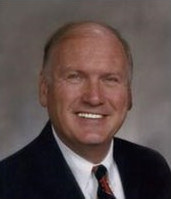 This talk discusses the concept of Zion as the kingdom of Jesus Christ on earth, composed of Saints who live in righteousness and purity of heart. Babylon, the opposite of Zion, is ruled by Lucifer and those who follow it do not seek the Lord’s righteousness. Zion must develop toward becoming the Holy City and tabernacle of God, inhabited by a pure people, and this can only be achieved by living the principles of the law of the celestial kingdom. The talk emphasizes the urgency of living these principles in preparation for the Lord’s second coming and achieving the highest order of priesthood society, which is the ideal of Zion.
This talk discusses the concept of Zion as the kingdom of Jesus Christ on earth, composed of Saints who live in righteousness and purity of heart. Babylon, the opposite of Zion, is ruled by Lucifer and those who follow it do not seek the Lord’s righteousness. Zion must develop toward becoming the Holy City and tabernacle of God, inhabited by a pure people, and this can only be achieved by living the principles of the law of the celestial kingdom. The talk emphasizes the urgency of living these principles in preparation for the Lord’s second coming and achieving the highest order of priesthood society, which is the ideal of Zion.
Brother Gardner then applies to Zion the six principles of the law of the Celestial Kingdom as outlined by President Kimball during the October 1977 General Conference: Love, Service, Work, Self-Reliance, Consecration, and Stewardship.
“Come to Zion”
Elder D. Todd Christofferson of the Quorum of the Twelve Apostles
October 2008 General Conference
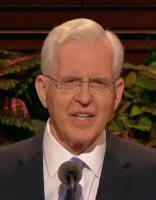 Elder Christofferson begins his talk by explaining that he Prophet Joseph Smith believed that the building up of Zion is a cause that has interested the people of God in every age, and that we are the favored people that God has made choice of to bring about the Latter-day glory. The antithesis and antagonist of Zion is Babylon, a symbol of decadent societies and spiritual bondage. The Lord calls for the elders of His Church to be sent forth across the world to accomplish the gathering of His people from all nations to Zion. And, He calls upon us to be beacons of righteousness to guide those who seek the safety and blessings of Zion.
Elder Christofferson begins his talk by explaining that he Prophet Joseph Smith believed that the building up of Zion is a cause that has interested the people of God in every age, and that we are the favored people that God has made choice of to bring about the Latter-day glory. The antithesis and antagonist of Zion is Babylon, a symbol of decadent societies and spiritual bondage. The Lord calls for the elders of His Church to be sent forth across the world to accomplish the gathering of His people from all nations to Zion. And, He calls upon us to be beacons of righteousness to guide those who seek the safety and blessings of Zion.
“Under the direction of the Prophet Joseph Smith, early members of the Church attempted to establish the center place of Zion in Missouri, but they did not qualify to build the holy city…. Rather than judge these early Saints too harshly, however, we should look to ourselves to see if we are doing any better.
“Zion is Zion because of the character, attributes, and faithfulness of her citizens. Remember, ‘the Lord called his people Zion, because they were of one heart and one mind, and dwelt in righteousness; and there was no poor among them’ (Moses 7:18). If we would establish Zion in our homes, branches, wards, and stakes, we must rise to this standard…. We cannot wait until Zion comes for these things to happen—Zion will come only as they happen.”
Elder Christofferson then dives deeper in discussing the unity, holiness, and care for the poor needed to bring Zion again. He ends his talk by reminding us that the Prophet Joseph Smith said, “We ought to have the building up of Zion as our greatest object”.
“Zion in the Midst of Babylon”
By Elder David R. Stone Of the Seventy
April 2006 General Conference
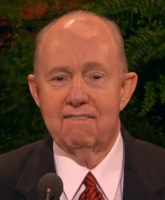 This talk is about creating “Zion in the midst of Babylon“, where Babylon is a city from ancient Israel that became corrupt and worshipped false gods, a city that symbolizes sensuality, decadence, and corruption. Elder Stone explains that this corruption and false worship can be seen in many cities today.
This talk is about creating “Zion in the midst of Babylon“, where Babylon is a city from ancient Israel that became corrupt and worshipped false gods, a city that symbolizes sensuality, decadence, and corruption. Elder Stone explains that this corruption and false worship can be seen in many cities today.
Elder Stone discusses the influence of culture on human behavior and how it shapes our preferences, beliefs, and attitudes towards various things such as food, clothing, sports, music, religion, morality, and more. He shares his personal experiences of living in different countries and observing the differences in customs and behaviors. Stone warns that people often become unaware of how their culture shapes them and may end up being like puppets on a string, blindly following what is considered “cool” by their society.
The challenge is to live in the world but not be of the world. Elder Stone encourages creating Zion in the midst of Babylon, being a light in the midst of spiritual darkness, and not being engulfed by the culture around us.
“Beware of Pride”
By President Ezra Taft Benson, President of the Church
April 1989 General Conference
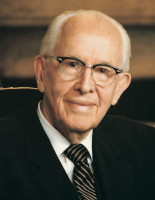 One would think that a talk that is considered by many to be the best talk on pride ever given would not be in a list of some LDS talks about Zion! After detailing what constitutes pride, and its opposite – humility, President Benson gives us the reason why it is so important that we all conquer pride. He indicates it’s our “divine destiny” as a church to “prepare to redeem Zion”. He then explains that it was pride that prevented the Saints from “establishing Zion in the days of the Prophet Joseph Smith”. And, it was pride that destroyed the Zion society described for us in Fourth Nephi.
One would think that a talk that is considered by many to be the best talk on pride ever given would not be in a list of some LDS talks about Zion! After detailing what constitutes pride, and its opposite – humility, President Benson gives us the reason why it is so important that we all conquer pride. He indicates it’s our “divine destiny” as a church to “prepare to redeem Zion”. He then explains that it was pride that prevented the Saints from “establishing Zion in the days of the Prophet Joseph Smith”. And, it was pride that destroyed the Zion society described for us in Fourth Nephi.
President Benson then wraps up his talk by repeating for emphasis the crucially-important concept that “Pride is the great stumbling block to Zion”. And, that to prepare to redeem Zion, “We must cleanse the inner vessel by conquering pride.”
“Unchangeableness of the Gospel”
Elder Wilford Woodruff of the Twelve Apostles
October 1873 General Conference
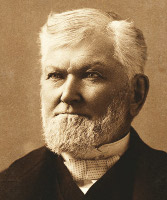 Somewhat in contrast to some LDS talks about Zion by more recent LDS General Authorities is this talk given by Wilford Woodruff. It is very representative of most of the dozen concepts taught frequently by leaders of the Church of Jesus Christ of Latter-day Saints during Utah’s years as a territory of the United States. All twelve concepts are well documented in the book, “Champions for Zion”. Elder Woodruff discusses (or mentions in passing) eight of the twelve concepts:
Somewhat in contrast to some LDS talks about Zion by more recent LDS General Authorities is this talk given by Wilford Woodruff. It is very representative of most of the dozen concepts taught frequently by leaders of the Church of Jesus Christ of Latter-day Saints during Utah’s years as a territory of the United States. All twelve concepts are well documented in the book, “Champions for Zion”. Elder Woodruff discusses (or mentions in passing) eight of the twelve concepts:
- A Zion was prophesied by ancient prophets for the Last Days.
- It’s Gods will that the Saints build Zion today.
- Building Zion is central to the Restored Gospel of Jesus Christ.
- Babylon and its fashions and traditions tempt us to forsake Zion.
- To build Zion, the Saints must “lay aside” Babylon and its influences.
- The Saints were building a Zion society in the Utah Territory.
- Building Zion is a “temporal work” (ie. It requires real physical labor).
- Cooperatives are a stepping stone to building Zion.